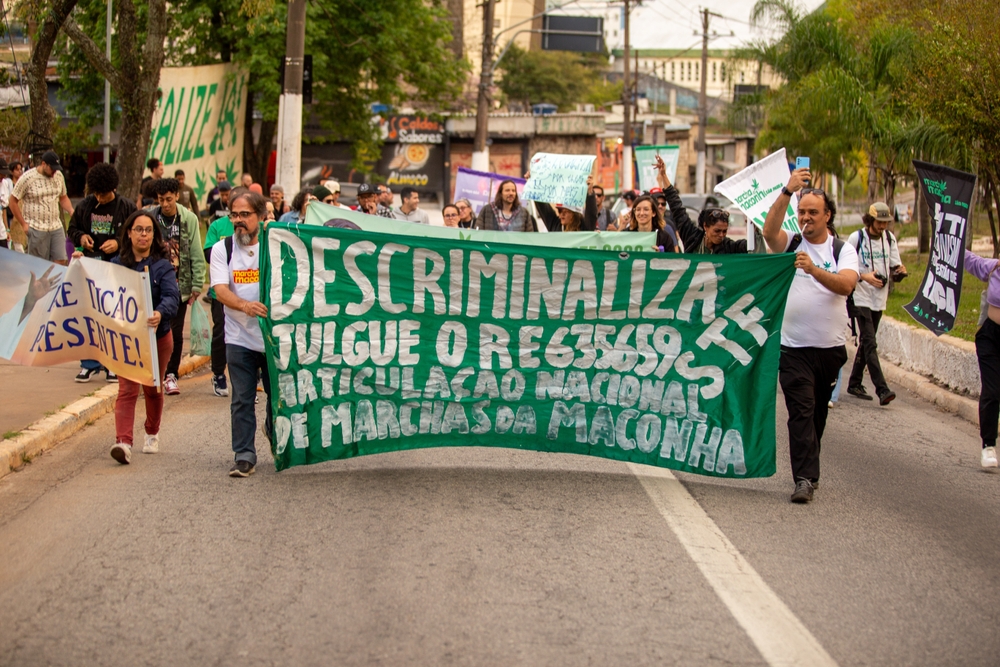In 2024, after 12 years of proceedings in the Brazilian Supreme Court, the process that may lead to the decriminalisation of cannabis in the country may finally reach a conclusion this year. Only six votes have been cast out of the 11 supreme judges: there are currently five votes in favour, with only one against the decriminalisation of the plant. And while the final voting action was postponed last year, only one more vote is needed to form a majority to push decriminalisation through.
The likely implementation of this decision will be much needed represent progress for drug policy reform in Brazil. However, prohibition and its ideas will find a way to persist, and the battle to create structural change to the Brazilian drug war will endure.
Cannabis in court
Initiated in 2011 based on a plea from the Public Defender in favour of a defendant convicted of being caught with 3 grams of cannabis in prison, the ongoing trial is historic because the decision on the specific case will have a national impact, creating a precedent for all similar cases that challenge the criminalisation of the plant for personal use.
The case under debate reached the Supreme Court after an appeal by the Public Defender’s Office against the decision of a lower court. The argument used was that the criminalisation of drug consumption violates the fundamental rights to freedom, privacy and self-harm, the latter understood as the individual’s prerogative to make decisions that are harmful exclusively to themselves.
There are many reasons why the case has progressed so slowly. There were numerous requests by court ministers to have more time to analyse the case; the appointment of conservative Supreme Court members by then-President Jair Bolsonaro meant that strategically the vote benefitted from a pause.
However, with the electoral defeat of the far-right government, civil society mobilisation and the consequent easing of political pressure on the court, the trial progressed in 2023 and will reach its final conclusion this year.
Despite the vote being focused on cannabis decriminalisation, one potentially lasting impact of a positive decision would be the legal differentiation of people in possession of cannabis from consumers and traffickers.
As this distinction currently does not exist, it is left to the interpretation of judges and the police. In a country marked by structural racism, this has meant that cannabis enforcement has been racist and classist, contributing to the increased incarceration of Black and poor people who are often classified as traffickers.
A small step towards legalisation, but a giant leap for abolition
The idea of the judges is to establish permission for an amount that can go up to 100 grams of the substance, in addition to authorisation for the home cultivation of up to 6 cannabis plants.
Experts, cannabis consumers and drug policy activists have criticised the trial’s potential outcome. This is because the criminalisation of the plant will remain, alongside the stigmatisation of other substances. Prohibition will remain as the dominant system of Brazilian drug control.
However, there is still cause for celebration: a 2023 study indicated that if a threshold for possession is established at 25 grams, about 27% of those currently convicted for trafficking this substance may have their sentences reviewed. If the threshold becomes 100g, then 48% of cannabis trafficking convictions would be reviewed. In these cases, the criminal review will depend on the individual request of each of the prisoners.
Given the possibility of reducing the current prisoner population and slowing down incarceration, which has been steadily increasing since 2006, decriminalization will be a tactical victory for the anti-prohibitionist movement due to its potential to raise awareness about the need to discuss drug legalization in Brazil and decarceration.
Disputes outside the court
With the concrete possibility of decriminalisation occurring through a judicial initiative, conservative political leaders are working to undermine the impact of the Supreme Court’s decision. In the Brazilian Senate, a proposal aims to amend the Brazilian constitution to criminalise the possession of drugs. The project has already been submitted and is about to be voted on by the Constitution and Justice Committee, before going to the Senate Plenary.
The measure is supported by Rodrigo Pacheco, the President of the National Congress, who seeks to push the proposal through. Pacheco, despite being a member of the support base of the current Lula government, aims with the proposal to criminalise drug possession to make a gesture to the right-wing senators who supported his candidacy for president of the Senate.
Furthermore, Pacheco’s proposal is a way to increase Congress’s power over controversial issues, such as drugs and abortion. In reaction to the progress of the case in court, the Senator stated that “We are the ones who have to create the law. The Supreme Court cannot say that 20 grams of marijuana is illegal or legal. The law does not say that”.
In the Chamber of Deputies, the expectation is that support for the project will be repeated, given the predominance of conservative politicians there.
The drug issue is also expected to shape the municipal elections taking place in October this year. Several candidates with anti-prohibitionist ideals will attempt to convince the Brazilian electorate of the need for drug policies based on the premises of harm reduction, especially in cities where there are drug use scenes, such as ‘Crackland’, in São Paulo, the economic centre of the country.
It is a frequent tactic of more conservative candidates to whip up moral panics around drug-related issues to reach political positions; this is a trend expected to continue throughout this year.
At the same time, the Brazilian anti-prohibitionist movement will continue mobilising support and public sentiment to end the drug war. In 2024, a record number of Weed Walks (Marcha da Maconha) are expected to take place in various cities across the country.
Weed Walks are street protests organised by a variety of different groups in Brazil. There are mothers of cannabis patients, psychedelic activists, Harm Reduction groups, hundreds of users and also some political parties. Despite the name, these protests advocate the end of the war on drugs and the legalization of substances other than cannabis.
Last year, events were held in more than 50 Brazilian cities. In São Paulo, a mobilisation of 100,000 people is expected under the banner of defending disobedience to unjust laws, whether enacted by the Judiciary or the Brazilian Legislative Power.
There’s great hope for the cannabis landscape in Brazil; however, these popular actions need to translate into political change to ensure a safer future for those that use, cultivate and share the plant.


